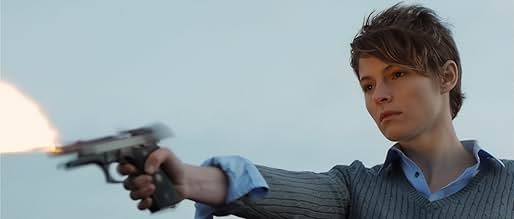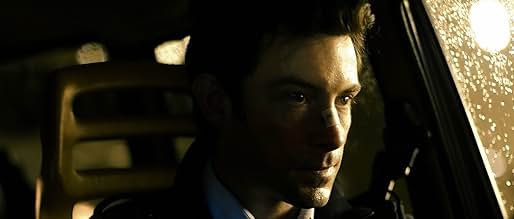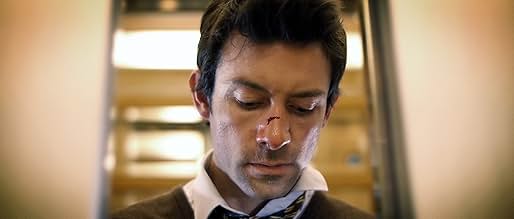ÉVALUATION IMDb
6,5/10
36 k
MA NOTE
Un homme et une femme sont attirés ensemble, empêtrés dans le cycle de vie d'un organisme sans âge. L'identité devient une illusion alors qu'ils luttent pour rassembler les fragments détaché... Tout lireUn homme et une femme sont attirés ensemble, empêtrés dans le cycle de vie d'un organisme sans âge. L'identité devient une illusion alors qu'ils luttent pour rassembler les fragments détachés de vies détruites.Un homme et une femme sont attirés ensemble, empêtrés dans le cycle de vie d'un organisme sans âge. L'identité devient une illusion alors qu'ils luttent pour rassembler les fragments détachés de vies détruites.
- Prix
- 5 victoires et 35 nominations au total
Andreon Michael
- Peter
- (as Andreon Watson)
John Walpole
- Bank Investigator
- (as Trey Walpole)
Avis en vedette
After this movie ended, I was dumbstruck. I sat looking at the end credits, searching through what I had just watched, remembering the film vividly, and yet having it still be a blur.
Upstream Color is not a literal movie. The plot is never explained directly to the viewer, and the actions taken by the characters are unclear in reason and motivation. The most obvious things I could say about the movie are that it is filmed very well, and it has a nice musical score.
But the movie is not about literal plot. It's not about literal characters. It's about feelings and thoughts. It's a movie about broken people trying to fix themselves. There are things everybody in the movie will understand, and there are things nobody will.
It's a lot like music. When you put on music, you know the mood, and you know the melody, and you know the tempo and the harmony, and it can be a beautiful experience, even though you have no idea what the lyrics mean. And upstream color is a lovely, almost meditative movie about the lives of everyone being interconnected, and about how when people form companionship they start to become one, and yet someone else may say totally opposite things than I'm saying, and they wouldn't be wrong.
It's not a movie for people that think a film must have a literal story. It's not a movie for people who won't watch an hour and a half of meditation. It's not for people who see movies to see stories. And there is no shame in disliking this movie. But if you can appreciate an abstract story and can sit through an hour and a half of meditation, this is the movie for you.
Stanley Kubrick said in his later years: "A film is - or should be - more like music than like fiction. It should be a progression of moods and feelings. The theme, what's behind the emotion, the meaning, all that comes later." If Stanley Kubrick were alive today, I think he would have liked this movie a lot.
Upstream Color is not a literal movie. The plot is never explained directly to the viewer, and the actions taken by the characters are unclear in reason and motivation. The most obvious things I could say about the movie are that it is filmed very well, and it has a nice musical score.
But the movie is not about literal plot. It's not about literal characters. It's about feelings and thoughts. It's a movie about broken people trying to fix themselves. There are things everybody in the movie will understand, and there are things nobody will.
It's a lot like music. When you put on music, you know the mood, and you know the melody, and you know the tempo and the harmony, and it can be a beautiful experience, even though you have no idea what the lyrics mean. And upstream color is a lovely, almost meditative movie about the lives of everyone being interconnected, and about how when people form companionship they start to become one, and yet someone else may say totally opposite things than I'm saying, and they wouldn't be wrong.
It's not a movie for people that think a film must have a literal story. It's not a movie for people who won't watch an hour and a half of meditation. It's not for people who see movies to see stories. And there is no shame in disliking this movie. But if you can appreciate an abstract story and can sit through an hour and a half of meditation, this is the movie for you.
Stanley Kubrick said in his later years: "A film is - or should be - more like music than like fiction. It should be a progression of moods and feelings. The theme, what's behind the emotion, the meaning, all that comes later." If Stanley Kubrick were alive today, I think he would have liked this movie a lot.
Here's a film which ponders suffering and celebrates beauty and meaning, so at least on this count I am firmly behind it.
The point is how to have the lesson, for instance that love redeems, which we know in words but often eludes us in life as experience that needs no explaining beyond itself, as actual insight, as something which wrapping it around us we will know its warmth by simple feel.
Well, most serious films try something of the sort.
Usually how it works, is that there is an interplay of 'hard' and 'soft' elements. Hard would be all the stuff that particularize and discriminate, the more of these we have the harder it is to have unmediated insight because what happens in the story registers in a topical way, for instance a story of female Irish workers in the sewing industry of 1915. Soft is the flow of urges and self as one space for reflection, Malick's latest seems to be the pinnacle at around this time. Wong Kar Wai does it.
Usually, we start with some 'hard' particulars and open up in a 'soft' way, shedding self. But now and then, we get a major blunder like Cloud Atlas where the point is the soft insight of interconnected life but that is fenced on all sides by hard impositions, conspiracies, gunfights etc.
This is a weird, complicated narrative, unnecessarily so for my taste but once you see past the complexity, it is a simple thing. The idea is that there is something in nature which worms its way into the soul and is the cause of all suffering. Seemingly this is producing the anomalies that manifest in the narrative, if suffering sounds overly religious call it an existential dissatisfaction or malaise. We get to see the effect of this in a relationship between a man and woman, how what is eating them keeps tossing them apart and together again.
The 'soft' portion of the film is this tumultuous relationship, the point is it could be yours. We have digress, dissonance, reluctance, knowing and knowing the other so well you can't tell his memories from your own. Some marvellous birdwatching, love as agreeing on the same birds.
Kar Wai is king of this 'pure' emotional space, because he traces particulars faintly into the night, the yearning and alienation as something elusive in the air. Malick which this film reminds of, renders them as huge, abstract forces that buffet us, war or loss.
Here, the entire framework is schematic and 'hard' in the extreme, an actual worm, hypnosis, a sinister surgery of some kind, more clearly the man who keeps the pigs fenced and wanders around trying to 'capture' on tape the manifold sounds, which stands for a broader human endeavor.
I find that this approach cheapens and reduces. Suddenly it is about technology and greed, a clumsy set of metaphors.
So overall, this comes heavily on the side of a silly eccentricity. Next to Malick who is an influence in the solemnity of atmosphere, I was reminded at times of Synecdoche, Wax: Or the Invention of Television among the Bees, Southland Tales, even Begotten, all of them ambitious ventures constrained by a symbolic notation on the ideas.
The ending is so silly it has to be seen, the choice of metaphors is the most ludicrous since Cremaster which all but destroys the film.
The point is how to have the lesson, for instance that love redeems, which we know in words but often eludes us in life as experience that needs no explaining beyond itself, as actual insight, as something which wrapping it around us we will know its warmth by simple feel.
Well, most serious films try something of the sort.
Usually how it works, is that there is an interplay of 'hard' and 'soft' elements. Hard would be all the stuff that particularize and discriminate, the more of these we have the harder it is to have unmediated insight because what happens in the story registers in a topical way, for instance a story of female Irish workers in the sewing industry of 1915. Soft is the flow of urges and self as one space for reflection, Malick's latest seems to be the pinnacle at around this time. Wong Kar Wai does it.
Usually, we start with some 'hard' particulars and open up in a 'soft' way, shedding self. But now and then, we get a major blunder like Cloud Atlas where the point is the soft insight of interconnected life but that is fenced on all sides by hard impositions, conspiracies, gunfights etc.
This is a weird, complicated narrative, unnecessarily so for my taste but once you see past the complexity, it is a simple thing. The idea is that there is something in nature which worms its way into the soul and is the cause of all suffering. Seemingly this is producing the anomalies that manifest in the narrative, if suffering sounds overly religious call it an existential dissatisfaction or malaise. We get to see the effect of this in a relationship between a man and woman, how what is eating them keeps tossing them apart and together again.
The 'soft' portion of the film is this tumultuous relationship, the point is it could be yours. We have digress, dissonance, reluctance, knowing and knowing the other so well you can't tell his memories from your own. Some marvellous birdwatching, love as agreeing on the same birds.
Kar Wai is king of this 'pure' emotional space, because he traces particulars faintly into the night, the yearning and alienation as something elusive in the air. Malick which this film reminds of, renders them as huge, abstract forces that buffet us, war or loss.
Here, the entire framework is schematic and 'hard' in the extreme, an actual worm, hypnosis, a sinister surgery of some kind, more clearly the man who keeps the pigs fenced and wanders around trying to 'capture' on tape the manifold sounds, which stands for a broader human endeavor.
I find that this approach cheapens and reduces. Suddenly it is about technology and greed, a clumsy set of metaphors.
So overall, this comes heavily on the side of a silly eccentricity. Next to Malick who is an influence in the solemnity of atmosphere, I was reminded at times of Synecdoche, Wax: Or the Invention of Television among the Bees, Southland Tales, even Begotten, all of them ambitious ventures constrained by a symbolic notation on the ideas.
The ending is so silly it has to be seen, the choice of metaphors is the most ludicrous since Cremaster which all but destroys the film.
Upstream Color is, by far, one of the absolute worst films I have ever seen. The movie is, and this is being nice, completely incomprehensible as a narrative work of film. It is nothing more than a bunch of random shots edited together with music and some occasional meaningless dialogue. It reminds me of the "video tests" people post to Vimeo when they're testing out their new still camera's video recording feature. The characters are never set up and the dialogue scenes are full of negative energy. As a result, I have absolutely no idea what they're talking about, I don't like them nor do I care what happens to them. I don't know what Shane Carruth was going for other than satisfying his own selfish need to vomit out this horrible tasting gallon of cryptic bile, but it certainly wasn't to try and entertain any human being with a normally functioning brain. I suspect the only reason this movie gets any press at all is due to its technical competency. That is, it looks like a properly shot movie and has a decent sound mix. If this movie had been shot "Dogme 95" style, I guarantee you would have walked out of the theater after 5 minutes instead of 10. The bottom line is that Shane Carruth does not respect a mainstream audience, and in fact takes every opportunity to insult them to their faces and mock them at the same time with this self-indulgent waste of projector lamp life.
I knew this film was going to be weird. Shane Carruth's debut film - Primer - was an oddity as it was, lacking in straightforward answers or explanations, but presenting a very intriguing and sturdy piece of hard science fiction. Be warned that Upstream Color is also something that lacks a straightforward explanation. In fact, Primer was something rather cold, with its strong basis in the scientific method; UC is far warmer and artistic, but is also more abstract.
The film may come off as slow and dull to certain viewers, especially if you're expecting a strong narrative structure or plot. I'm usually adverse to movies that have no real plot or conflict, but with this film, it's the experience that matters. Watching this film is a strangely mesmerizing, lucid, and smooth experience, given the exquisite imagery, nuanced performances, and quality music score. The film's first fifteen minutes are probably the most straightforward, most interesting, and most disturbing aspect of the whole thing, and it serves as an important fulcrum point. This much I understand: the film starts off with the freaky notion that there's a man injecting grubs into people, which makes them susceptible to mind control. From then on, the film tracks two such victims who inevitably come together and discover the secrets of their latent trauma.
What makes the film so weird, so cerebral, and potentially frustrating, is that things happen, and characters will say things that won't make total sense. And most scenes are intercut with such footage as a farmer tending to pigs, and flowers growing in the wilderness. The movie draws stark parallels between such images, to unearth some rich thematic territory. Could such scenes reflect on life and death? Is it all about nature? Is it about love? Is it the human condition overall? The film never really tell you outright, and it gets very surreal when scenes overlap. If you struggle to find logic behind this story, you might write it off as messy. If you take in the experience and open your mind to interpreting the film, it'll keep your brain going and haunt you indefinitely. It's an experience comparable to such films as Mulholland Drive.
This film is very stylish, with some beautiful photography and ingenious editing. All actors put on decent performances, and they show a good blend of nuance and emotion. Writing is pretty weird, given the amount of strange and unusual dialogue. This production uses excellent sets, props, and costumes. The music score is very exquisite.
While Primer was a film that appeals on an intellectual level, Upstream Color appeals best to the artistic side of the brain. If you're susceptible to strange, abstract films that require lots of brainpower to interpret and understand, then this one is a perfect puzzlebox for you. Casual audiences might want to approach this with caution.
5/5 (Experience: Very Good | Content: Very Good | Film: Perfect)
The film may come off as slow and dull to certain viewers, especially if you're expecting a strong narrative structure or plot. I'm usually adverse to movies that have no real plot or conflict, but with this film, it's the experience that matters. Watching this film is a strangely mesmerizing, lucid, and smooth experience, given the exquisite imagery, nuanced performances, and quality music score. The film's first fifteen minutes are probably the most straightforward, most interesting, and most disturbing aspect of the whole thing, and it serves as an important fulcrum point. This much I understand: the film starts off with the freaky notion that there's a man injecting grubs into people, which makes them susceptible to mind control. From then on, the film tracks two such victims who inevitably come together and discover the secrets of their latent trauma.
What makes the film so weird, so cerebral, and potentially frustrating, is that things happen, and characters will say things that won't make total sense. And most scenes are intercut with such footage as a farmer tending to pigs, and flowers growing in the wilderness. The movie draws stark parallels between such images, to unearth some rich thematic territory. Could such scenes reflect on life and death? Is it all about nature? Is it about love? Is it the human condition overall? The film never really tell you outright, and it gets very surreal when scenes overlap. If you struggle to find logic behind this story, you might write it off as messy. If you take in the experience and open your mind to interpreting the film, it'll keep your brain going and haunt you indefinitely. It's an experience comparable to such films as Mulholland Drive.
This film is very stylish, with some beautiful photography and ingenious editing. All actors put on decent performances, and they show a good blend of nuance and emotion. Writing is pretty weird, given the amount of strange and unusual dialogue. This production uses excellent sets, props, and costumes. The music score is very exquisite.
While Primer was a film that appeals on an intellectual level, Upstream Color appeals best to the artistic side of the brain. If you're susceptible to strange, abstract films that require lots of brainpower to interpret and understand, then this one is a perfect puzzlebox for you. Casual audiences might want to approach this with caution.
5/5 (Experience: Very Good | Content: Very Good | Film: Perfect)
UPSTREAM COLOR is already baffling the hell out of the world and will especially draw disapproval on IMDb.
The plot is not delivered in a way that is traditionally comprehensible, only to those paying close attention to the themes that unite it all. If you're already rolling your eyes THIS MOVIE IS NOT FOR YOU.
If however you have experienced or would like to experience films where you have to dedicate your ability to assess and determine the underlying idea that is linking a series of enigmatic actions and subtle scenes, UPSTREAM COLOR will intrigue and probably charm you. It very much plays to the TREE OF LIFE crowd.
For me, it's undoubtedly a massive artistic accomplishment. Hugely evocative and if you unearth those ideas, the ability to have human connection, abuse, hope and language among them, you'll have no problem following along and the ending will be very satisfying.
If you want to say "you're not supposed to understand it, just feel it" that's fine. I think that if you stop and ask yourself what idea is driving moments, you can follow along just fine. The story is in the themes. Details are abstract to drive home this point.
I took off two stars because I found the serious tone and sombre score to be so focused and constant, the atmospherics became a little more monotonous than I think was intended. The briefest of levity here and there might have offset the heaviness.
If you're still reading, check it out.
The plot is not delivered in a way that is traditionally comprehensible, only to those paying close attention to the themes that unite it all. If you're already rolling your eyes THIS MOVIE IS NOT FOR YOU.
If however you have experienced or would like to experience films where you have to dedicate your ability to assess and determine the underlying idea that is linking a series of enigmatic actions and subtle scenes, UPSTREAM COLOR will intrigue and probably charm you. It very much plays to the TREE OF LIFE crowd.
For me, it's undoubtedly a massive artistic accomplishment. Hugely evocative and if you unearth those ideas, the ability to have human connection, abuse, hope and language among them, you'll have no problem following along and the ending will be very satisfying.
If you want to say "you're not supposed to understand it, just feel it" that's fine. I think that if you stop and ask yourself what idea is driving moments, you can follow along just fine. The story is in the themes. Details are abstract to drive home this point.
I took off two stars because I found the serious tone and sombre score to be so focused and constant, the atmospherics became a little more monotonous than I think was intended. The briefest of levity here and there might have offset the heaviness.
If you're still reading, check it out.
Le saviez-vous
- AnecdotesThe film that Kris is editing at the beginning of the movie is A Topiary, the film that Shane Carruth had begun production on before deciding to film Upstream Color instead.
- GaffesWhen the Sampler is incapacitating a pig with his instrument, the knot is thrown towards the pig's face and stretched. In the next frame, the wire knot is around the pig's body between its front & hind legs.
- ConnexionsFeatured in WatchMojo: Top 10 Best Sci-Fi Movies You've Probably Never Seen (2016)
Meilleurs choix
Connectez-vous pour évaluer et surveiller les recommandations personnalisées
- How long is Upstream Color?Propulsé par Alexa
Détails
Box-office
- Budget
- 50 000 $ US (estimation)
- Brut – États-Unis et Canada
- 444 098 $ US
- Fin de semaine d'ouverture – États-Unis et Canada
- 28 649 $ US
- 7 avr. 2013
- Brut – à l'échelle mondiale
- 587 174 $ US
Contribuer à cette page
Suggérer une modification ou ajouter du contenu manquant

Lacune principale
By what name was Upstream Color (2013) officially released in India in Hindi?
Répondre































